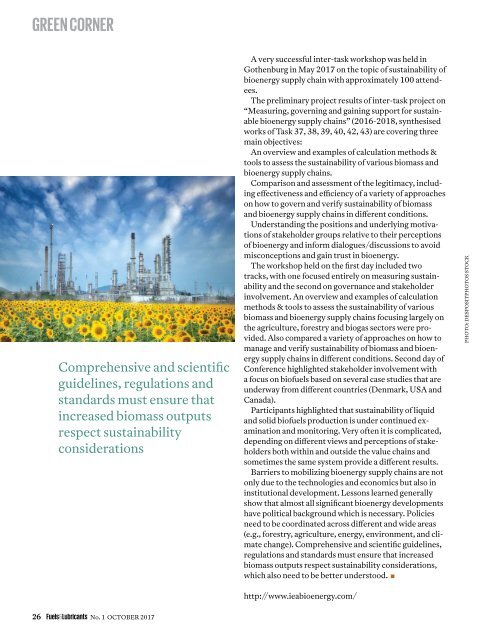Fuels & Lubricants Magazine
Issue 1, October 2017
Issue 1, October 2017
Create successful ePaper yourself
Turn your PDF publications into a flip-book with our unique Google optimized e-Paper software.
Green Corner<br />
Comprehensive and scientific<br />
guidelines, regulations and<br />
standards must ensure that<br />
increased biomass outputs<br />
respect sustainability<br />
considerations<br />
A very successful inter-task workshop was held in<br />
Gothenburg in May 2017 on the topic of sustainability of<br />
bioenergy supply chain with approximately 100 attendees.<br />
The preliminary project results of inter-task project on<br />
“Measuring, governing and gaining support for sustainable<br />
bioenergy supply chains” (2016-2018, synthesised<br />
works of Task 37, 38, 39, 40, 42, 43) are covering three<br />
main objectives:<br />
An overview and examples of calculation methods &<br />
tools to assess the sustainability of various biomass and<br />
bioenergy supply chains.<br />
Comparison and assessment of the legitimacy, including<br />
effectiveness and efficiency of a variety of approaches<br />
on how to govern and verify sustainability of biomass<br />
and bioenergy supply chains in different conditions.<br />
Understanding the positions and underlying motivations<br />
of stakeholder groups relative to their perceptions<br />
of bioenergy and inform dialogues/discussions to avoid<br />
misconceptions and gain trust in bioenergy.<br />
The workshop held on the first day included two<br />
tracks, with one focused entirely on measuring sustainability<br />
and the second on governance and stakeholder<br />
involvement. An overview and examples of calculation<br />
methods & tools to assess the sustainability of various<br />
biomass and bioenergy supply chains focusing largely on<br />
the agriculture, forestry and biogas sectors were provided.<br />
Also compared a variety of approaches on how to<br />
manage and verify sustainability of biomass and bioenergy<br />
supply chains in different conditions. Second day of<br />
Conference highlighted stakeholder involvement with<br />
a focus on biofuels based on several case studies that are<br />
underway from different countries (Denmark, USA and<br />
Canada).<br />
Participants highlighted that sustainability of liquid<br />
and solid biofuels production is under continued examination<br />
and monitoring. Very often it is complicated,<br />
depending on different views and perceptions of stakeholders<br />
both within and outside the value chains and<br />
sometimes the same system provide a different results.<br />
Barriers to mobilizing bioenergy supply chains are not<br />
only due to the technologies and economics but also in<br />
institutional development. Lessons learned generally<br />
show that almost all significant bioenergy developments<br />
have political background which is necessary. Policies<br />
need to be coordinated across different and wide areas<br />
(e.g., forestry, agriculture, energy, environment, and climate<br />
change). Comprehensive and scientific guidelines,<br />
regulations and standards must ensure that increased<br />
biomass outputs respect sustainability considerations,<br />
which also need to be better understood.







